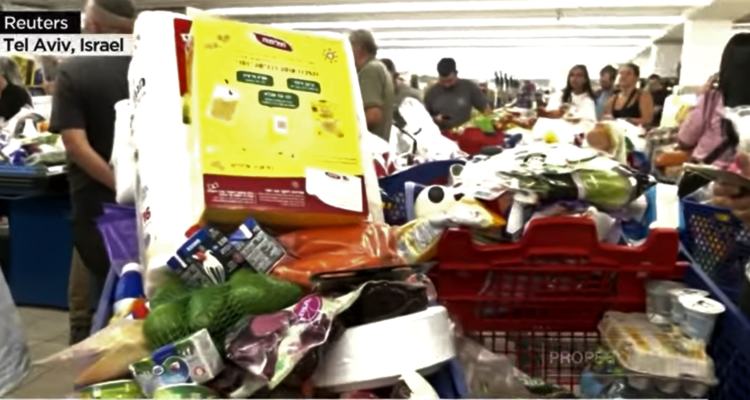Major Israeli supermarket sets purchase limitations on the amount of water, bread, milk, and eggs that can be bought per individual customer.
By World Israel News Staff
A spokesman for Israel’s Home Front Command reminded citizens to store 72 hours’ worth of food and water at their homes on Monday evening, triggering panic buying that left some supermarket shelves empty and saw massive lines of shoppers trying to stock up.
Shortly afterwards, the spokesman clarified that this was a general recommendation and not due to an anticipated change in the availability of food and water due to the ongoing war.
In a hastily released statement, the Home Front Command stressed that there was no reason to head out to the shops to buy large amounts of supplies, but the damage was already done.
Within an hour of the announcement made on prime time TV, Hebrew-language news channels broadcast images of long lines of shoppers snaking through the aisles – and sometimes out into the parking lots – of grocery stores, as Israelis rushed to fill their carts with basic necessities.
On Tuesday morning, Yossi, a resident of Israel’s Sharon coastal plain region, headed over to a local supermarket to pick up groceries.
He told World Israel News that to his surprise, some of the shelves in the market were stripped bare and had not been replenished since the mass shopping rush the night before.
“All the water and toilet paper were totally gone,” Yossi recounted. “All the [prepackaged] snacks [like chips], too.”
Canned food items, such as beans, corn, and tuna, were “about half gone,” he added.
Numerous grocery stores reported that they were sold out of water, toilet paper, canned goods, and other basic items, leading to rationing of those products in branches with little supply left.
Ori Watermann, the CEO of Shufersal, one of Israel’s largest supermarket chains, announced in a media statement on Tuesday morning restrictions on the amount of essential products sold to individual customers.
“Out of responsibility towards all customers and due to heavy demand, supply difficulties and a partial shortage of products in branches, we have decided to limit the purchase of basic food products such as water, eggs, bread and milk,” said Watermann.
Among the limits announced by Shufersal were three liters of milk, one carton of eggs, two loaves of bread, and two six-packs of large water bottles per shopper.





